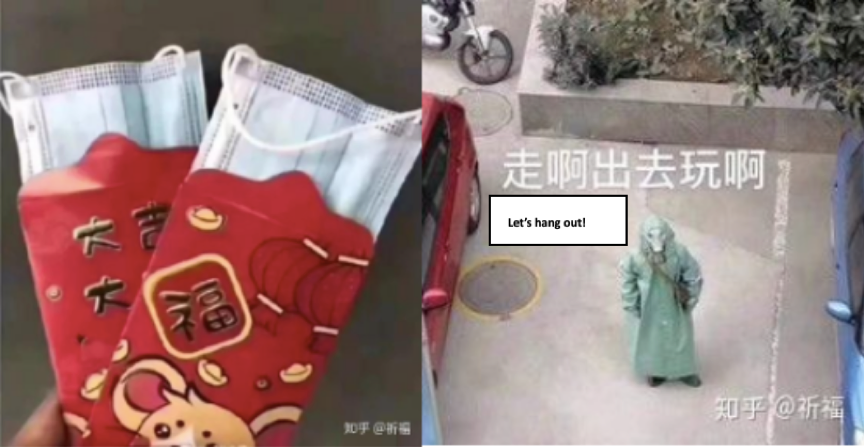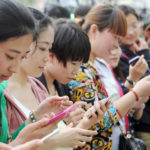Chinese daily life during the Coronavirus outbreak: Facing boredom with humor and digitization
How are Chinese people entertaining themselves during the Coronavirus outbreak?
The 2020 Lunar New Year will be remembered for more than just the year of the rat. In addition to celebrating the New Year with family, China also had its hands full containing the outbreak of the Novel Coronavirus. The economic impact of the Coronavirus can be felt around the world. On 23rd January, the Wuhan’s Government decided to seal off the city from all outside contact in an effort to stop the spread of the Coronavirus. Since then, other cities in China have decided to cancel public events and citizens are suggested to stay at home. In a few short weeks, the streets of Chinese cities went from bustling with traffic and pedestrians to eerily empty. As the virus spreads, many cities in the coastal province of Zhejiang are now also getting sealed off. To prevent more spread, a majority of Chinese are cooped up in their homes. While Wuhan fights the virus, Chinese people are fighting off boredom. Lets look at the Chinese daily life during the coronavirus outbreak
Chinese are active on social media platforms during the coronavirus outbreak in China
Weibo: share updated information of the Novel Coronavirus
Weibo (similar to Twitter) is the most popular social media platform which enables Chinese people to share and discuss up-to-date information regarding the Novel Coronavirus in China. According to Weibo, on February 4, 2020, approximately 13 out of 23 topics are about the Novel Coronavirus in China. In addition to the information of the Novel Coronavirus, topics related to as celebrities, like Kobe Bryant’s death, are being discussed on Weibo. Some topics reaching over 1 million reads per minute.
WeChat Posts: Chinese are staying updated on the virus
WeChat (similar to WhatsApp) is also a popular social media platform which enables Chinese people to access up-to-date information regarding the Novel Coronavirus in China. During the period of Chinese New Year, the updated Novel Coronavirus is placed in the top on every user’s page so that they are able to access this information easily.
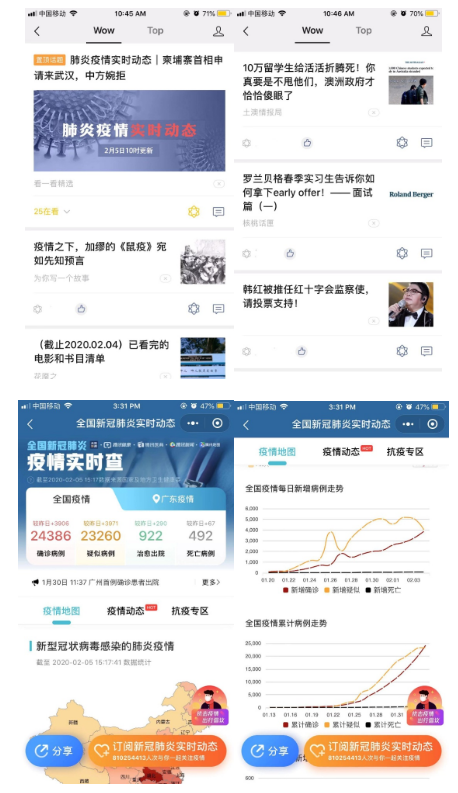
[Photo source: WeChat, ‘Update of Novel Coronavirus’]
Chinese are extensively using video platforms
According to the ranking in App Store, in the entertainment sector, 7 out of 10 apps are video platforms. This has proven that Chinese people are keen on watching movies or TV dramas during the Coronavirus outbreak. Cinema in China has temporarily shut down during this period. Nevertheless, this does not impede the release of New Year Movies. One example is the debut online premier of Lost in Russia. By the 27th January, it has reached 0.6 billion of views from 0.18 billion viewers. Since then more than 26 New Year Movies, including ones from previous years, have been on via video platforms such as Youku, TenCent and iQIYI.
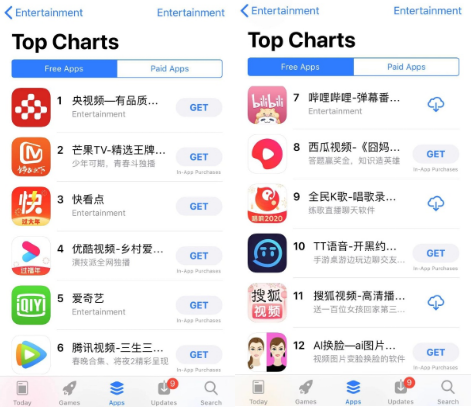
[Photo source: App Store, ‘Ranking of entertainment apps’]

[Photo source: 36Kr, ‘New Year Movies in 2020’]
Online shopping: medical products and daily necessities
E-commerce is a major part of the Chinese daily life during the Coronavrus outbreak. Since Chinese people are not suggested to go out, they do even more shopping online. According to JD’s Big Data Research Institute, during the Chinese New Year in 2020, people were likely to purchase medical products ( medicine and masks), hygiene products (hand wash and disinfectant) and food. From 24th January to 4th January, JD has delivered 19, 000 tons of staple food, 5.9 million liters of cooking oil, 15 million units of instant noodles and 4000 tons of fresh food.
During the Chinese New Year in 2020, several food sectors have prominent performances. Sales of cooking oil experienced a significant growth with 556% YOY. Compared with the same period last year, sales of prepared food and instant drinks increased by 423% while that of dairy products rose by 300%. Sales of staple food were 20 times more than the figure last Chinese New Year and sales of frozen food were 7 times more than that in the same period last year.
As for the fresh food sector, sales during the Chinese New Year in 2020 were 370% more than that prior to this period. Furthermore, the sales of vegetables were 9 times more than that in the same period last year. The sales of meat were 7.5 times more than that of the last Chinese New Year. The below graph shows how the proportion of sales on JD changed between 2019 and 2020.

[Data source: JD Big Data Research Institute, ‘Change in consumption during CNY (2020 VS 2019)’]
Mobile Gaming: multiplayer online battle arena sector is the most popular. Plague Inc. rises ahead
The outbreak of the Novel Coronavirus caused Chinese citizens to turn to gaming for in-home entertainment. Data has revealed that Chinese people have spent more time gaming during the Chinese New Year in 2020. According to Baidu Index, the searches related to mobile gaming has boosted from 26th January onwards. According APP store rankings, Honor of Kings and Game for Peace are the most popular mobile games among Chinese people. During the last Chinese New Year, the daily active users of Honor of Kings was consistently 70 million whereas that of Game for Peace was 30 million. However, the performance during the Chinese New Year in 2020 is more outstanding. The daily active users of Honor of Kings has reached 120 to 150 million while that of Game for Peace has reached 80 to 100 million during this period.
Coronavirus inspires gamers to play Plague Inc.
Besides, it is noticeable that Plague Inc. has become increasingly popular along with the expanding influence of the Coronavirus. According to the ranking in the App Store, since January 19th, downloads have surged rapidly and it is now ranked first in the paid game sector.
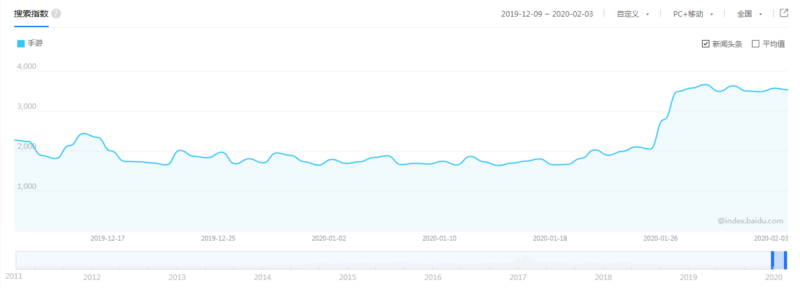
[Photo source: Baidu Index, ‘Search index of mobile gaming’]
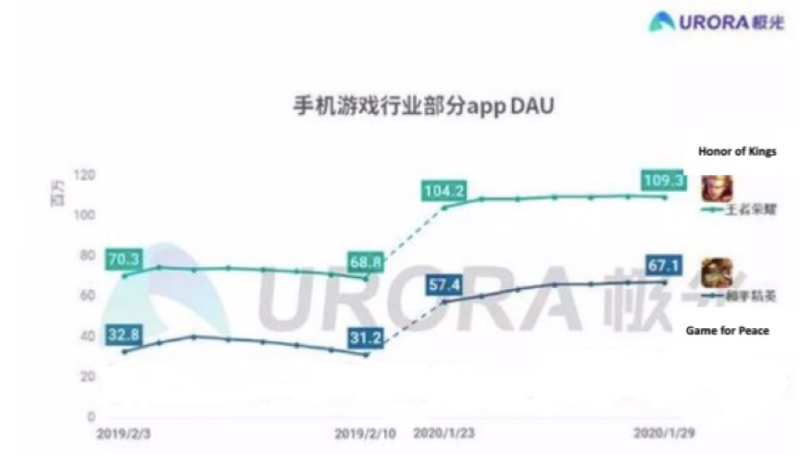
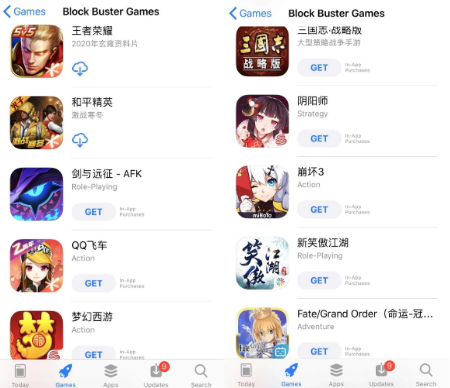
[Photo source: App Store, ‘Ranking of game apps’]
Online fitness: Rejoice Sport and Keep are keeping Chinese active during the Coronavirus outbreak
During the Coronavirus outbreak, Chinese are looking for ways to stay in shape. Mobile fitness apps such as Rejoice Sport and Keep are gaining traction, as they can do exercise at home. According to qimai, from 27th January onwards, the search index has increased drastically and maintained at 9407. Prior to the Chinese New Year in 2020, the figure fluctuated around 8600.

[Photo source: qimai, ‘Search index of Keep’]
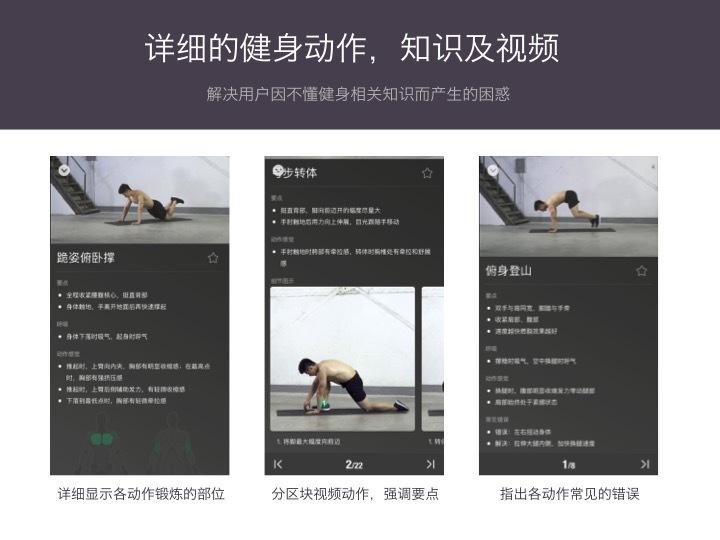
[Photo source: zcool, ‘Page of Keep’]
Education Platforms: Chinese students study through the Coronavirus outbreak
The Coronavirus outbreak does not affect Chinese students’ passion on study. The downloads of Some education apps such as Yuan Fu Dao, Ren Jiao Dian Du and Xueersi Online School experience a significant increase. Moreover, from 9th January to 30th January, the period prior to the Chinese New Year, the search index of the mentioned apps remained stable. However, from 30th January onwards, the 6th day of the Chinese New Year, their search index have risen significantly to around 9000.
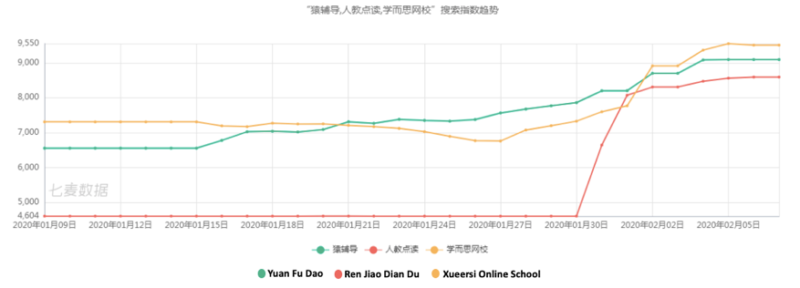
[Photo source: qimai, ‘Search index of education apps’]
Discussion forum and cooking apps get traffic during the coronavirus outbreak
Other mobile apps such as XiaChuFang (cooking app), Zhihu (similar to Quora) and Douban (similar to Reddit) are also popular with Chinese people during the Chinese New Year in 2020. Moreover, it is noticeable that the search index of Xia Chu Fang has boosted from 27th January onwards and has reached 9000. During the coronavirus outbreak, Chinese people dare not dine out. Cooking at home seems to be an alternative for them. On 4th February, the app was out of order and it had terrified lots of users as they claimed to rely on such an app for cooking.
As for the discussion forum, Zhihu and Douban, Zhihu has maintained its search index around 9250 during the Chinese New Year in 2020 whereas Douban has stable increase in search index since 27th January.
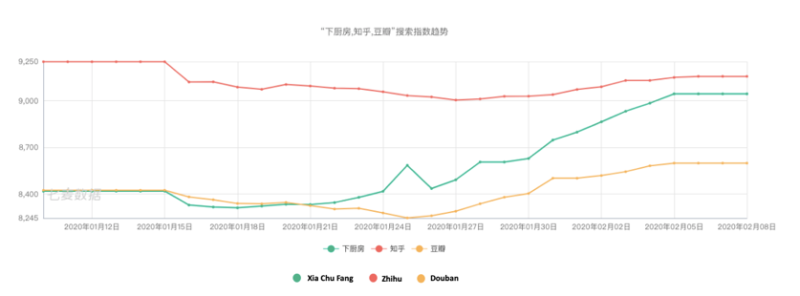
[Photo source: qimai, ‘Search index of discussion forum and cooking app’]
Traditional games and activities during Chinese New Year in 2020 have been brought online
In general, traditional games in Chinese New Year such as paying a new year call (拜年), and playing Chinese poker and mahjong are common activities during Chinese New Year. However, these activities require gathering and are likely to spread the coronavirus among families. In order to avoid such activities, there are now penalties for gather to play games, and people are encouraged to report these to the police. Despite the fact that gathering to play Chinese pokers and mahjong is prohibited, online Chinese pokers and mahjong are the alternatives. According to qimai, on 7th February, the search index of different types of Chinese pokers occupied the top-5 positions in the ranking of game’s search index. This has indicated the popularity of these traditional games.
In the image below of top searched APPs during the Coronavirus outbreak, all poker games are circled in red.
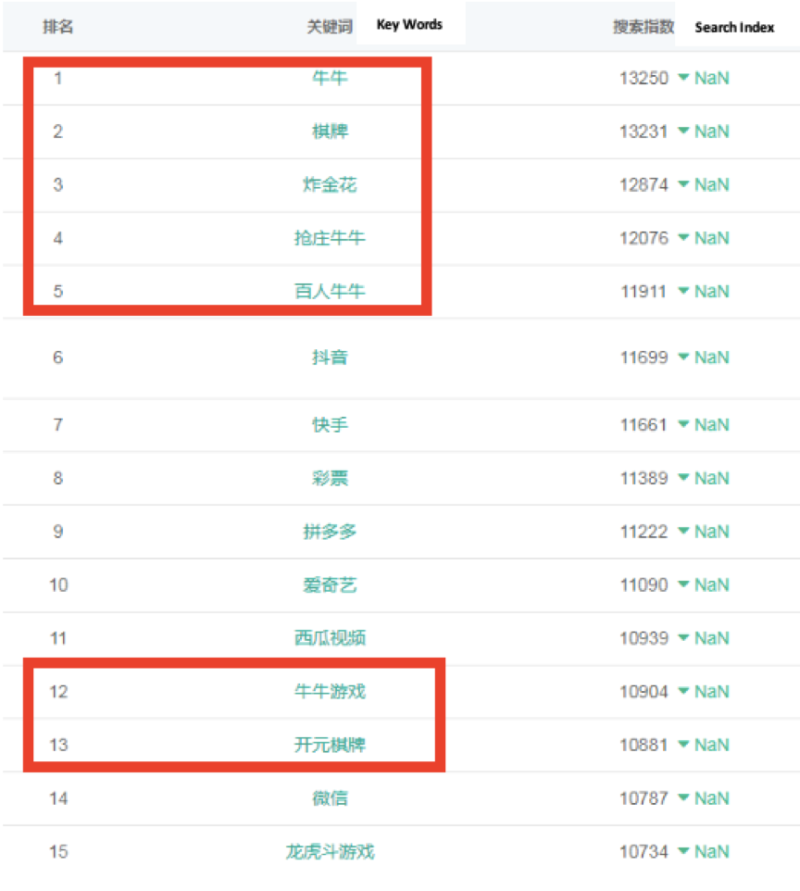
[Photo source: qimai, ‘Ranking of game’s search index: Chinese poker games are circled in red’ ]
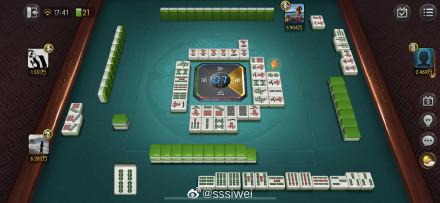
[Photo source: yiwan, ‘Online mahjong’]
Coronavirus made a 1000 year old tradition go digital
Chinese people normally go to the temple fair during Chinese New Year to pray for luck and health for their families. With over 1000 years of history, it is hard to imagine a Chinese new year where families do not gather at local temples. However, owing to the outbreak of Coronavirus, the temple was banned in every Chinese city.
Nevertheless, there is an alternative for this event. For example, the temple fair in Foshan, Guangdong has switched to a online temple fair. Every year, on the 16th day of the Chinese New Year residents from Foshan carry handmade windmills and lettuce through a bridge, which can bring luck and happiness to people. This year, people from Foshan attended the temple fair via their mobile phones. By browsing and clicking the handmade windmills and lettuce that appeared on the page, users were able to “walk through the bridge” as if they did so in reality. Photos of the temple fair are placed on the page so that users could feel the event’s atmosphere.

[Photo source: Sohu, ‘Temple Fair in Foshan (2018)’ ]
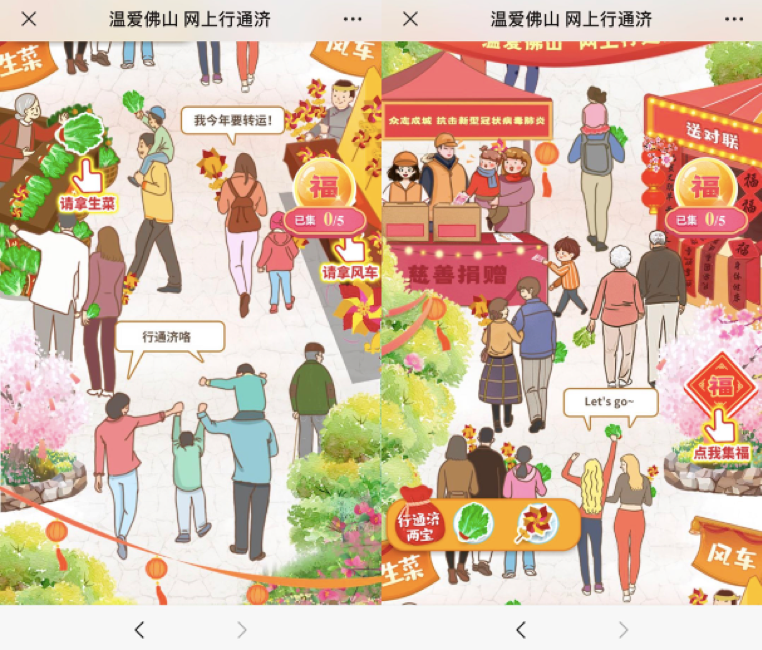
[Photo source: WeChat, ‘Online Temple Fair in Foshan (2020)’]
Unusual activities that combat boredom during the Coronavirus outbreak
Even though Chinese people can access a variety of activities via electronic devices, some people feel extremely bored at home. According to Baidu Index, the search index of “Boring” and “Stuck at home” has surged significantly during the Chinese New Year in 2020.
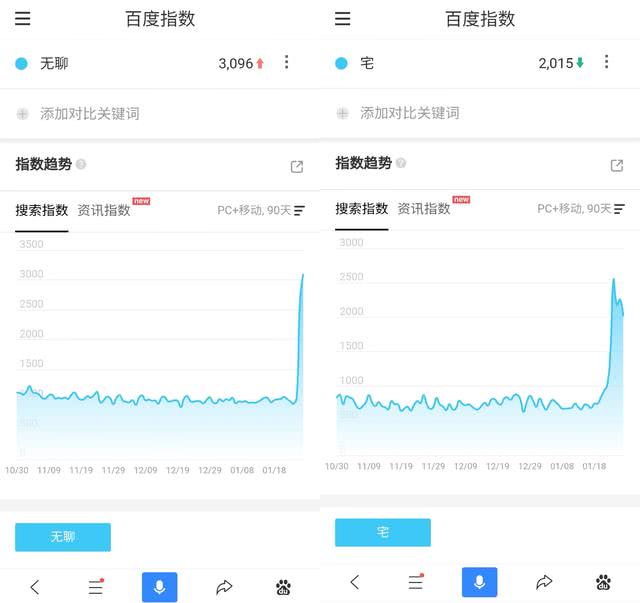
[Photo source: Baidu Index, ‘Search index of “boring” (on the left) and “Stuck at home” (on the right)’ shows boredom in the Chinese daily life during the Coronavirus outbreak]
Therefore, what to do at home has become a popular topic on social media. On Weibo, Chinese people are likely to search “how to kill time at home”, “what to do at living room”, etc. Some Chinese have funny ideas like fishing at home and making crafts with seeds.

[Photo source: Sina, ‘Fishing at home’]

[Photo source: Sina, ‘Seed craft’]
On 27th January, residents from Wuhan launched an event, singing at the window, in order to cheer themselves up. At 8 PM, residents from different communities in Wuhan played the music and sang at the window. Lately, this event was criticized by doctors as it increased the risk of coronavirus infection.
Coronavirus memes created by Chinese netizens: embody non-mask phobia
Even if the current situation in China is serious, Chinese have faced it with a sense of humor. The following memes and funny pictures embody this.
People are suggested to wear masks in the public area. On 26th January 2020, Guangdong government has established a policy regarding wearing masks in public areas. Penalties apply to people who refuse to wear masks. A lot of memes are created and are related to masks during the Coronavirus outbreak. Chinese people tease that masks are trendy, even putting masks on their pets. Moreover, masks are precious and are thought to be luxurious gifts, sharing them in Red Envelopes which are normally used for gifting money.
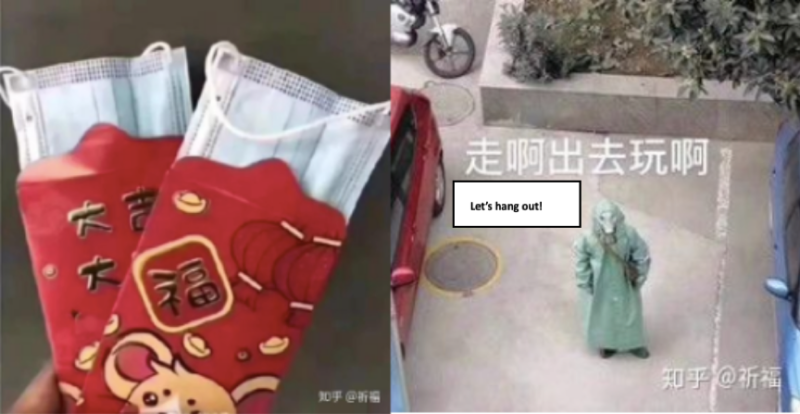
[Photo source: Zhihu, ‘Memes of Coronavirus’]
When the coronavirus started to break out in China, the older generation were in contempt of it and refused to wear masks. It was hard for Chinese youth to convince them. Thus, they create lots of memes which embody their helplessness.
Thankfully, the situation has reversed. Due to the spread of the coronavirus in China, the older generation has gradually been aware of how serious the situation is and now wear masks while going out.

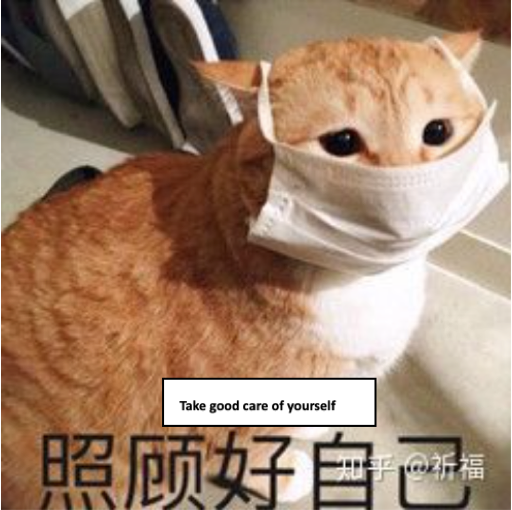

[Photo source: Zhihu, ‘Memes of Coronavirus’]
During the Coronavirus outbreak, Henan province has been widely discussed on social media due to its effective precaution. Every village in Henan has implemented a strict rule, that is, people are not allowed to visit the village that they do not come from. Villagers take turns to guard the entrance and prevent other people from entering.

[Photo source: Huxiu, ‘Villagers from Henan, guarding the entrance’]
Author: Amelia Han


